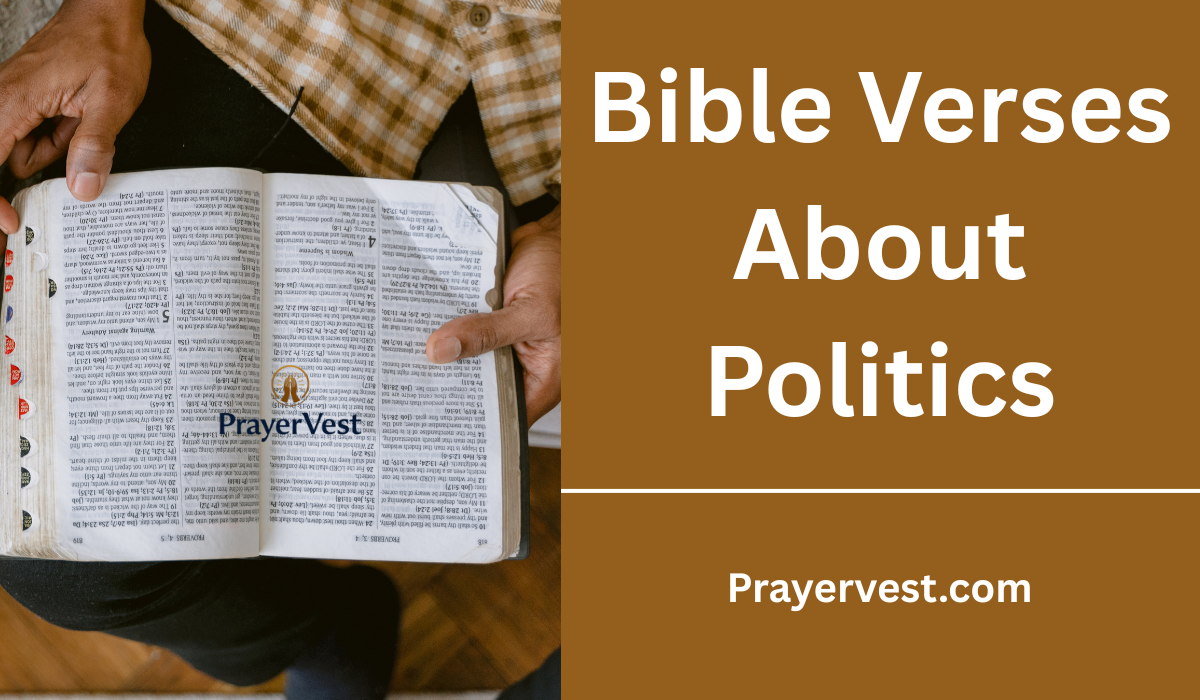Although politics is sometimes seen as a field of human power, legislation, and governance, the Bible offers timeless insights into the subject. Scripture offers direction on accountability, leadership, justice, and the function of authority in society.
The Bible contains guidelines that influence how Christians should approach political issues, emphasizing morality, integrity, humility, and service, even though it does not outline a political system in the contemporary sense. Fundamentally, biblical teaching reminds us that God is in charge of all nations and that He is ultimately responsible for human governance.
The Bible also discusses believers’ obligations in political situations. Verses about praying for people in power, praising leaders, and abiding by the law demonstrate that politics and religion are not mutually exclusive. Rather, it serves as a platform for Christians to pursue justice and the common good while exhibiting fidelity to God.
The Bible presents politics as a field where faith and action converge, from the prophets who dared to challenge monarchs to the apostles who preached about integrity and subordination.


Examining political verses in the Bible teaches us how to strike a balance between our ultimate allegiance to God’s kingdom and our loyalty to earthly governments. It pushes us to be good citizens, work for peace, and defend justice while acknowledging that no governmental structure can ever fully replace God’s righteousness. These texts give believers the knowledge, judgment, and unshakeable faith they need to successfully negotiate complicated political environments and make sure that our political participation always reflects God’s truth and love.
40 Powerful Bible Verses About Politics (2026)
1. Proverbs 29:2
“When the righteous thrive, the people rejoice; when the wicked rule, the people groan.”
This verse captures the direct relationship between leadership and the well-being of a nation. Righteous leaders bring justice, peace, and stability, leading to joy among the people. Conversely, corrupt or wicked rulers create suffering and unrest. The verse serves as a reminder that politics is not just about power, but about responsibility before God. It urges citizens and leaders alike to value integrity and righteousness, as these qualities ultimately shape the quality of life in society.
2. Daniel 2:21
“He changes times and seasons; he deposes kings and raises up others. He gives wisdom to the wise and knowledge to the discerning.”
This passage emphasizes God’s sovereignty over political authority. Leaders may come and go, but their rise and fall are under God’s control. It reminds us that earthly power is temporary and ultimately subject to divine will. For believers, this verse offers comfort and perspective—no matter how chaotic politics may seem, God’s plan is unfolding. It also underscores the importance of seeking wisdom and discernment in navigating political matters, rather than relying solely on human strategy.
3. Romans 13:1
“Let everyone be subject to the governing authorities, for there is no authority except that which God has established.”
Paul’s words here stress the divine origin of governing systems. While not all leaders act righteously, the institution of government itself is part of God’s design for order and justice. Submission, therefore, is not about blind obedience but about recognizing God’s ultimate authority behind structures of leadership. This verse challenges Christians to balance respect for authority with discernment, ensuring that their allegiance to God remains above all while still contributing positively to civic life.
4. Micah 6:8
“He has shown you, O mortal, what is good. And what does the Lord require of you? To act justly and to love mercy and to walk humbly with your God.”
This foundational verse extends beyond personal piety into the realm of public responsibility. Justice, mercy, and humility are not only private virtues but also essential political values. Leaders and citizens alike are called to reflect God’s character in the way they govern, legislate, and participate in society. Politics, when aligned with these principles, becomes a tool for advancing the well-being of all people. This verse provides a timeless moral compass for ethical leadership and political engagement.
5. 1 Timothy 2:1-2
“I urge, then, first of all, that petitions, prayers, intercession and thanksgiving be made for all people— for kings and all those in authority, that we may live peaceful and quiet lives in all godliness and holiness.”
Paul reminds the church to prioritize prayer for political leaders and governing authorities. This shows that spiritual responsibility extends beyond personal devotion to include concern for the wellbeing of society. Praying for leaders—whether they align with our preferences or not—invites God’s guidance into political affairs. The goal is not merely political success but peace, justice, and the flourishing of godliness in public life.
6. Psalm 33:12
“Blessed is the nation whose God is the Lord, the people he chose for his inheritance.”
This verse reveals the connection between a nation’s prosperity and its reverence for God. While it initially refers to Israel, its principle remains timeless: true national blessing comes when God is acknowledged as supreme. Political systems, laws, and leadership cannot guarantee lasting success apart from God’s favor. It reminds leaders and citizens alike that political strength must be undergirded by spiritual devotion.
7. Deuteronomy 16:18
“Appoint judges and officials for each of your tribes in every town the Lord your God is giving you, and they shall judge the people fairly.”
Here, God commands Israel to establish systems of governance rooted in fairness and justice. The emphasis is on impartiality and accountability, values that remain crucial in modern political life. Leaders are not to abuse their power but to ensure equity for all. This verse shows that God cares deeply about how political systems operate, holding leaders responsible for creating just societies.
8. Jeremiah 29:7
“Also, seek the peace and prosperity of the city to which I have carried you into exile. Pray to the Lord for it, because if it prospers, you too will prosper.”
Even in exile, God’s people were commanded to contribute positively to the welfare of the city. This reveals a principle of political and civic engagement: believers should not withdraw from society but actively seek its peace and prosperity. By praying for and working toward the common good, Christians honor God and help create environments where all people can thrive.
9. Proverbs 11:14
“For lack of guidance a nation falls, but victory is won through many advisers.”
This proverb underscores the importance of wise counsel in political leadership. No ruler or government can succeed in isolation; collaboration, humility, and openness to advice are key to national stability. It warns against prideful or reckless leadership and points to the need for collective wisdom in shaping political decisions. Wise governance comes from valuing sound guidance rather than depending solely on personal strength.
10. Isaiah 1:17
“Learn to do right; seek justice. Defend the oppressed. Take up the cause of the fatherless; plead the case of the widow.”
God calls His people to active engagement in justice, highlighting care for the vulnerable as central to political and social life. This verse challenges any form of governance that neglects or exploits the weak. True political leadership reflects God’s heart by defending the marginalized. It is a reminder that power should be used to protect and uplift rather than dominate and oppress.
11. Psalm 72:1-2
“Endow the king with your justice, O God, the royal son with your righteousness. May he judge your people in righteousness, your afflicted ones with justice.”
This prayer highlights the divine responsibility of political leaders to rule with fairness and compassion. True governance is not about self-interest or power but about reflecting God’s justice in the treatment of people, especially the vulnerable. Leaders are called to exercise authority with righteousness, ensuring equity and compassion permeate their decisions.
12. Proverbs 21:1
“The king’s heart is a stream of water in the hand of the Lord; he turns it wherever he will.”
This verse reminds us that even the most powerful rulers remain under God’s control. Political events may seem driven by human agendas, but God ultimately directs the course of nations. For believers, this is a source of hope, showing that God’s will prevails above all human schemes. It calls us to trust in His sovereignty over political systems and outcomes.
13. Matthew 22:21
“So give back to Caesar what is Caesar’s, and to God what is God’s.”
Jesus’ response to the Pharisees on taxes reveals the balance between civic duty and divine allegiance. While believers are called to respect governing authorities, ultimate loyalty belongs to God. This verse encourages Christians to engage responsibly in civic life without compromising their faith. It establishes the principle that political obligations should never overshadow spiritual devotion.
14. Deuteronomy 17:18-19
“When he takes the throne of his kingdom, he is to write for himself on a scroll a copy of this law… It is to be with him, and he is to read it all the days of his life so that he may learn to revere the Lord his God.”
God instructs that leaders must ground themselves in His Word. A king’s authority should be tempered by humility and obedience to God’s law. This demonstrates that political leadership is not autonomous but accountable to divine principles. Leaders who immerse themselves in God’s Word are better equipped to rule justly, resisting pride and corruption.
15. Titus 3:1-2
“Remind the people to be subject to rulers and authorities, to be obedient, to be ready to do whatever is good, to slander no one, to be peaceable and considerate, and always to be gentle toward everyone.”
Paul emphasizes Christian responsibility toward civic authorities. Submission, however, is paired with a higher calling to goodness, kindness, and peace. This verse teaches that political engagement should be marked by respect and gentleness, not rebellion or hostility. Believers are to reflect Christ’s character while participating in society.
16. Isaiah 33:22
“For the Lord is our judge, the Lord is our lawgiver, the Lord is our king; it is he who will save us.”
This verse beautifully encapsulates the completeness of God’s authority: He embodies judicial, legislative, and executive power. While earthly politics distributes power among institutions, God alone holds it fully and perfectly. This truth reassures believers that ultimate justice and salvation do not depend on human governments but on the Lord Himself.
17. Psalm 2:10-11
“Therefore, you kings, be wise; be warned, you rulers of the earth. Serve the Lord with fear and celebrate his rule with trembling.”
This psalm warns political leaders to govern with humility under God’s authority. Arrogance in leadership leads to downfall, but reverence for God ensures wise governance. It shows that rulers are accountable not only to their people but also to the Lord of all nations. Political power is temporary; divine authority is eternal.
18. Ecclesiastes 10:2
“The heart of the wise inclines to the right, but the heart of the fool to the left.”
Here, wisdom and folly are contrasted in political and moral decision-making. A wise leader makes choices that align with righteousness, while a foolish one acts destructively. This verse underscores the importance of discernment in governance, reminding leaders that their values and choices shape the destiny of their people.
19. Zechariah 7:9-10
“This is what the Lord Almighty said: ‘Administer true justice; show mercy and compassion to one another. Do not oppress the widow or the fatherless, the foreigner or the poor.’”
God’s standard for politics is crystal clear: justice, mercy, and protection for the vulnerable. Leaders are judged not by their wealth or military power but by how they treat the marginalized. This verse reminds us that governance aligned with God’s heart always uplifts and protects the disadvantaged.
20. Acts 5:29
“Peter and the other apostles replied: ‘We must obey God rather than human beings!’”
While Christians are called to respect authority, this verse makes clear that obedience to God takes precedence when human laws contradict divine will. Political loyalty must never overshadow spiritual faithfulness. This balance ensures that believers remain good citizens while holding ultimate allegiance to Christ as King above all rulers.
21. Proverbs 28:2
“When a country is rebellious, it has many rulers, but a ruler with discernment and knowledge maintains order.”
This proverb highlights the instability that comes with rebellion and corruption. Frequent leadership changes often signal political turmoil. In contrast, wise and knowledgeable rulers provide stability and order. This verse stresses the importance of discernment and consistency in governance for the peace of a nation.
22. Isaiah 10:1-2
“Woe to those who make unjust laws, to those who issue oppressive decrees, to deprive the poor of their rights and withhold justice from the oppressed of my people.”
God strongly condemns leaders who create unjust laws. Politics, when corrupted by oppression, robs people of their dignity and rights. This passage serves as a timeless warning against legislative abuse and exploitation. True governance aligns with God’s standard of justice and protects the weak rather than exploiting them.
23. Jeremiah 22:3
“This is what the Lord says: Do what is just and right. Rescue from the hand of the oppressor the one who has been robbed. Do no wrong or violence to the foreigner, the fatherless or the widow.”
Here, God commands leaders to uphold justice and protect the marginalized. Politics is not about enriching the powerful but about defending those most vulnerable to exploitation. The verse reveals God’s heart for justice in public affairs and calls leaders to stand against oppression and violence.
24. Matthew 20:25-26
“You know that the rulers of the Gentiles lord it over them, and their high officials exercise authority over them. Not so with you. Instead, whoever wants to become great among you must be your servant.”
Jesus redefines leadership as service, not domination. Political power is often abused for self-interest, but true greatness comes through humility and service. This principle applies to political leaders as well, reminding them that authority should be exercised for the benefit of the people, not personal gain.
25. Psalm 146:3
“Do not put your trust in princes, in human beings, who cannot save.”
This verse reminds us not to idolize political leaders. While governance is necessary, ultimate salvation and security do not come from human rulers but from God. It challenges us to maintain perspective: political solutions are temporary, but God’s sovereignty is eternal.
26. Exodus 18:21
“But select capable men from all the people—men who fear God, trustworthy men who hate dishonest gain—and appoint them as officials over thousands, hundreds, fifties and tens.”
Moses was instructed to appoint leaders based on integrity, wisdom, and fear of God. This verse provides a blueprint for political leadership rooted in character rather than ambition. Trustworthy governance depends on leaders who reject corruption and value justice above personal gain.
27. Proverbs 14:34
“Righteousness exalts a nation, but sin condemns any people.”
The moral character of a nation determines its destiny. A country that upholds righteousness will prosper, while sin leads to downfall. This verse highlights the connection between spiritual health and political success, urging societies to align their governance with godly values.
28. 2 Samuel 23:3-4
“The God of Israel spoke… ‘When one rules over people in righteousness, when he rules in the fear of God, he is like the light of morning at sunrise on a cloudless morning.’”
This poetic passage portrays righteous leadership as a blessing to a nation. A just ruler brings peace, joy, and stability, much like the beauty of dawn after darkness. The imagery emphasizes the life-giving effect of political leadership rooted in reverence for God.
29. Amos 5:24
“But let justice roll on like a river, righteousness like a never-failing stream!”
Amos calls for justice and righteousness to flow through society continually. This verse speaks powerfully into political life, demanding that governance uphold fairness, not corruption. Justice should not be a temporary act but an ongoing, natural outpouring in leadership and lawmaking.
30. Philippians 3:20
“But our citizenship is in heaven. And we eagerly await a Savior from there, the Lord Jesus Christ.”
While Christians engage in earthly politics, their ultimate allegiance is to heaven. This verse provides perspective: earthly governments are temporary, but the kingdom of God is eternal. It encourages believers to participate responsibly in society without losing sight of their higher citizenship in Christ.
31. Matthew 5:14
“You are the light of the world. A town built on a hill cannot be hidden.”
Jesus calls His followers to live as visible examples of truth and righteousness. In politics, this means believers should reflect integrity, compassion, and justice, influencing society positively. Rather than withdrawing from public life, Christians are called to be guiding lights in political and civic engagement.
32. Nehemiah 2:17
“You see the trouble we are in: Jerusalem lies in ruins, and its gates have been burned with fire. Come, let us rebuild the wall of Jerusalem, and we will no longer be in disgrace.”
Nehemiah’s leadership demonstrates the importance of vision and action in rebuilding a nation. His political and organizational skill was grounded in prayer and reliance on God. This verse highlights how godly leadership inspires communities to rise above despair and work together for restoration.
33. Romans 12:18
“If it is possible, as far as it depends on you, live at peace with everyone.”
This instruction emphasizes the believer’s responsibility to promote peace, even in the midst of political disagreements. While conflict may sometimes be unavoidable, Christians are called to be peacemakers, fostering unity rather than division in society. Politics should not become a platform for hatred but a means for building peace.
34. Deuteronomy 1:13
“Choose some wise, understanding and respected men from each of your tribes, and I will set them over you.”
Moses instructed Israel to appoint leaders based on wisdom, understanding, and respect. Political systems flourish when leaders are chosen for their character and discernment rather than ambition or popularity. This verse remains a model for selecting just and effective governance.
35. Ezekiel 45:9
“This is what the Sovereign Lord says: You have gone far enough, princes of Israel! Give up your violence and oppression and do what is just and right. Stop dispossessing my people, declares the Sovereign Lord.”
God directly rebukes corrupt leaders who exploit their people. Political power is not meant for violence or oppression but for justice and protection. This verse underscores God’s intolerance of corruption and His expectation for leaders to govern fairly.
36. Mark 10:44-45
“And whoever wants to be first must be slave of all. For even the Son of Man did not come to be served, but to serve, and to give his life as a ransom for many.”
Jesus sets the ultimate model of leadership as service. Politics is often pursued for status and privilege, but Christ redefines leadership as sacrificial service for the good of others. Leaders who embrace this principle transform society through humility and love.
37. Zephaniah 3:5
“The Lord within her is righteous; he does no wrong. Morning by morning he dispenses his justice, and every new day he does not fail, yet the unrighteous know no shame.”
This verse contrasts God’s perfect justice with the corruption of human rulers. While earthly politics may be flawed, God consistently upholds righteousness. It encourages believers to trust in God’s unwavering justice even when political systems fall short.
38. Colossians 3:23-24
“Whatever you do, work at it with all your heart, as working for the Lord, not for human masters.”
This principle applies to political service as well as personal life. Leaders and citizens alike are reminded that their ultimate accountability is to God. Politics, when done wholeheartedly for the Lord, becomes an act of worship and service, not just human duty.
39. Proverbs 16:12
“Kings detest wrongdoing, for a throne is established through righteousness.”
The stability of political leadership depends on moral integrity. Wickedness undermines authority, while righteousness strengthens it. This verse shows that a nation’s longevity and prosperity are tied to the ethical conduct of its leaders.
40. Revelation 11:15
“The seventh angel sounded his trumpet, and there were loud voices in heaven, which said: ‘The kingdom of the world has become the kingdom of our Lord and of his Messiah, and he will reign for ever and ever.’”
This final vision points to the ultimate political reality: Christ’s eternal reign. All earthly kingdoms and governments are temporary, but God’s kingdom endures forever. This verse gives believers hope that justice, peace, and righteousness will prevail when Christ establishes His unshakable rule.
Conclusion
Finally, political verses in the Bible serve as a reminder that although human governments change throughout time, God’s sovereignty never does. Scripture teaches that although citizens are urged to accept authority, seek peace, and live in ways that glorify God, leaders are required to govern with justice, fairness, and humility. A biblical perspective on politics transforms it from a contest for dominance into a chance to embody God’s principles of justice, compassion, and truth in society.
In the end, the Bible reminds us that our greatest loyalty is to God’s kingdom. We must always remember the everlasting power of Christ, the King of monarchs, even while we are obligated to participate responsibly in earthly administration. These scriptures encourage Christians to participate in politics with courage, humility, and discernment, making sure that every choice and action is based on faith and directed by God’s Word.






